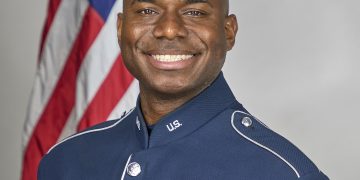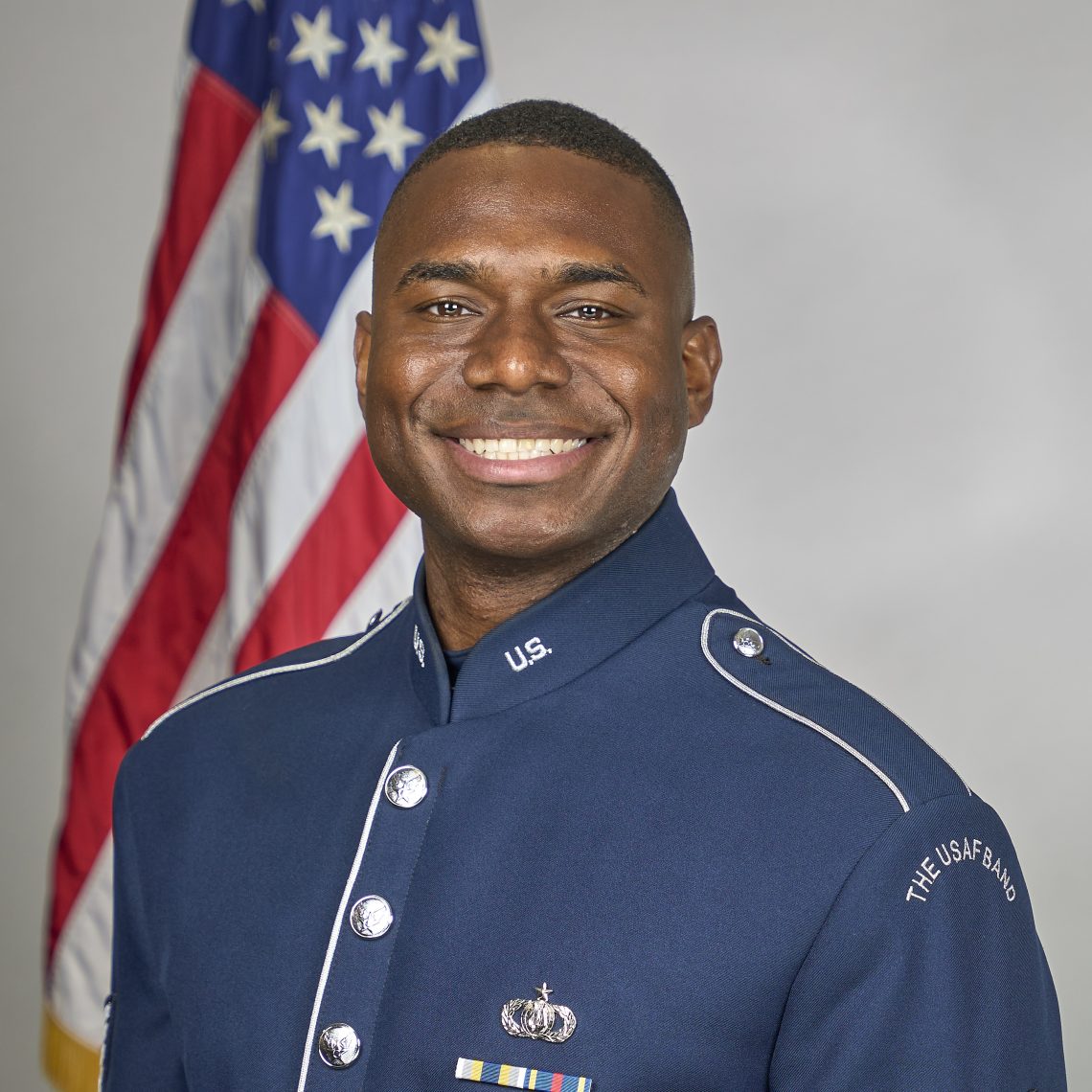Technical Sergeant Fareed Simpson-Hankins’ musical journey to the United States Air Force Band is a story of embracing opportunities to shape a career in music. From an eight-year-old playing trumpet in Philadelphia public schools to earning a place in the prestigious Airmen of Note, Sgt. Simpson-Hankins’ path is a testament to the transformative power of music education, mentorship, and dedication.
Fareed has been surrounded by music for his entire life. His mother, a singer, and his father and grandfather, both drummers (who played alongside Philadelphia luminaries like Philly Joe Jones and Jimmy Heath) created a household filled with rhythm and melody. Trips to his parents’ gigs became a regular part of his upbringing. At a school assembly, Fareed encountered the trumpet for the first time and was captivated by its sound. While his parents were puzzled by his choice of instrument, they supported his enthusiasm.
Kathy Kilpatrick, his school music teacher and family friend, played a pivotal role in Fareed’s early development. Recognizing his potential, she recommended the Temple Community Music Scholars program, where Fareed honed his skills under the guidance of working musicians like Mike Franchetti and Jason O’Mara. Franchetti introduced him to professional experiences at a young age, inviting him to play in pit orchestras with community and school productions, giving Fareed his first taste of earning money through music. O’Mara, a jazz instructor, encouraged the young Fareed to audition for the program’s jazz band in fifth grade, even though Fareed hadn’t yet mastered his scales. An older student wrote out the scales for him, and though he didn’t have them memorized, O’Mara allowed him to use the music during the audition. Fareed made the band as its youngest member, playing the works of Thad Jones, Count Basie, and Duke Ellington—repertoire he continues to cherish. The jazz band became a foundational experience, where weekly solos and lessons in improvisation built his confidence and skills.
Fareed’s love for music continued through high school, but he initially saw it as a hobby rather than a career. When he applied to Temple University, it was as a chemistry major with aspirations to become a pharmacist. However, a solo performance on Duke Ellington’s “Echoes of Harlem” during a jazz competition at Temple caught the attention of faculty, leading to an invitation to apply as a music student.
His parents were initially cautious, understanding the challenges of a musician’s life. However, a scholarship and the possibility of a double major in chemistry and music convinced them to support Fareed’s aspirations. Balancing both fields proved daunting, and he sought advice from mentors, including trumpet teachers Tanya Darby, Nick Marchione, and Terell Stafford. Stafford’s suggestion to define his personal notions of success and happiness led Fareed to shift his focus fully to music, with chemistry as a minor.
During his time at Temple, Fareed performed with the university’s jazz band alongside legendary guest artists like Jimmy Heath, Jon Faddis, Joe Lovano, and John Clayton. One unforgettable moment occurred while playing lead trumpet on Heath’s “Gingerbread Boy.” Mid-performance, Faddis unexpectedly joined in (taking Fareed’s part up an octave), much to Heath’s surprise when he turned around!
These experiences, coupled with Fareed’s graduate studies in jazz, laid the foundation for his professional career. However, like many musicians, the COVID-19 pandemic disrupted his trajectory. With gigs on hold, Fareed worked at Whole Foods and Amazon while maintaining his practice routine. He also began teaching K-5 music at a Montessori school and later transitioned to an arts program, allowing him to rebuild his performance schedule.
Fareed’s path took a significant turn when he considered auditioning for the U.S. Air Force Band’s Airmen of Note. Initially hesitant about a military band, he sought advice from mentors, including Stafford, who said, “This audition has your name on it.” Encouraged by his peers and inspired by the challenge, Fareed prepared rigorously, micro-analyzing his performances through recording to ensure perfection.
When the call came offering him the position, Fareed says, “I muted my phone, screamed with excitement, and then calmly came back on and accepted.” Joining the Airmen of Note marked a new chapter in his career, one where he could combine his love for music with the unique opportunities the Air Force provides.
Nearing the end of his first year with the Airmen of Note, Fareed balances a demanding schedule of high-level performances, travel, and personal practice. He also remains deeply connected to his roots, teaching an early jazz ensemble at Temple University and sharing his passion for the works of Louis Armstrong, Jimmie Lunceford, and early Count Basie.
For Tech. Sgt. Simpson-Hankins, success and happiness intersect in his ability to pursue his passion while inspiring others. Whether biking to work, skiing, running, or performing with the Airmen of Note, he embraces a life enriched by music, movement, and meaningful connections.




















